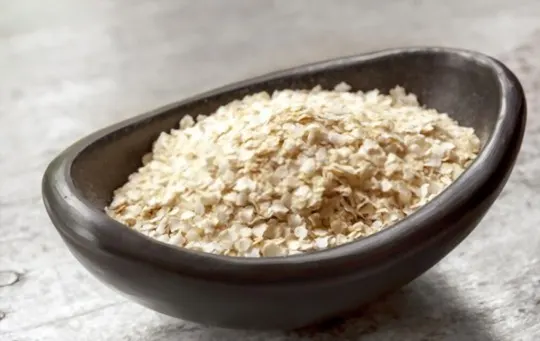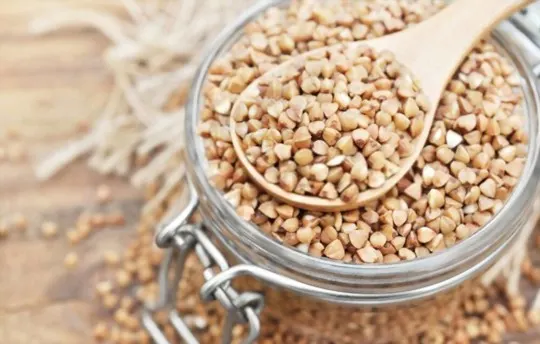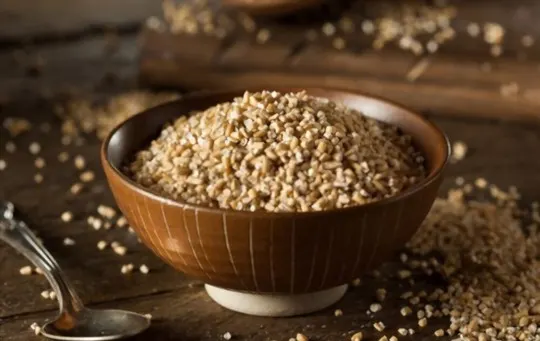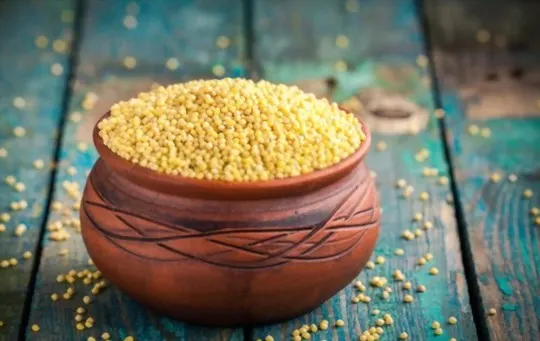Switching up your breakfast game? We’ve got your back.
Old fashioned oats are a staple, no doubt.
Yet, sometimes, it’s refreshing to mix things up.
Ever thought of what else could kickstart your morning right?
We’re here to spill the beans on the top 5 substitutes that are not only easy to prepare but pack a punch in terms of nutrition and flavor.
These alternatives might just surprise you and become your new go-to morning fuel.
Stay tuned, because your breakfast is about to get a whole lot more interesting.
What are Old-Fashioned Oats?

Old-fashioned oats have been a staple breakfast for centuries, and for a good reason.
Densely packed with essential minerals such as magnesium, Vitamin B6 and Iron, these oats offer so many health benefits.
They are excellent for controlling blood sugar and cholesterol levels, among other things.
When it comes to taste and texture, old-fashioned oats are chewy yet fluffy with subtle nutty flavoring that makes them the perfect addition to any morning routine.
If you’re looking to take multiple steps in a healthier direction this year, why not give oatmeal a try? While usually eaten as porridge, you can also add them to your favorite smoothies or create delicious oat cookies.
Regardless of how you decide to integrate these versatile oats into your culinary repertoire, you’ll soon discover their nutritional value is what truly sets them apart from other grains.
The 5 Best Substitutes for Old Fashioned Oats
Breakfast is the most important meal of the day, so why not make it interesting and exciting? One ingredient that has been a staple breakfast item for centuries is old-fashioned oats.
But what if you’re looking for something new or want to switch up your routine? Here are five awesome substitutes for old-fashioned oats that will make your mornings taste a little bit more delicious.
1 – Quinoa Flakes

If you’re looking for the ideal breakfast cereal that adds a tasty and healthy boost to your morning, then look no further than quinoa flakes.
This nutritious superfood is packed with essential vitamins and minerals, as well as being gluten-free.
Quinoa flakes have a light, crunchy texture, reminiscent of traditional oatmeal but with added nutritional benefits.
They can be used in a variety of dishes or incorporated into smoothies and other recipes.
Although they don’t cook up quite as fluffy as regular oatmeal, they do make an excellent substitute for old-fashioned oats in most recipes.
The subtle nutty flavor of quinoa flakes is truly delightful and provides a little something special to upgrade your breakfast routine.
2 – Buckwheat

Buckwheat has become a popular addition to the modern pantry, with good reason.
A close relative of rhubarb, buckwheat is an incredibly nutritious whole grain that’s jam-packed with essential vitamins and minerals, including magnesium, potassium, manganese, and zinc.
It also contains plenty of fiber and protein—two nutrients important for satiety and regular blood sugar levels.
Buckwheat has a mild flavor that can vary from mildly sweet to slightly earthy; its texture is chewy on the outside but fluffy and soft on the inside.
Because buckwheat doesn’t contain gluten, it can make an easy substitute for old-fashioned oats in dishes like savory granola bowls or even creamy porridge; this hearty grain can also be used in salads and stir-fries for added texture.
3 – Steel-cut Oats

Steel-cut oats are whole grain, an unprocessed alternative to their more common and refined counterpart, the old-fashioned rolled oats.
A steel-cut oat is created by slicing whole groats with a steel blade, resulting in a chewy texture that many people find more flavorful than conventional oats.
It also retains much of its nutritional value, as it contains more protein and dietary fiber than regular rolled oats.
Steel-cut oats can be used in both sweet and savory recipes but have the most appeal when cooked low and slow, creating a creamy porridge or hearty side dish or snack.
As they take longer to cook than regular rolled oats, they are often prepared in bulk to be reheated throughout the week.
While not an exact substitute for old-fashioned oatmeal due to its different taste and texture profile, steel-cut oats are an excellent way to add variety to your breakfast routine without sacrificing nutrition.
4 – Amaranth

Amaranth is one of the most ancient and versatile grains, with origins dating back thousands of years in the Aztec and Mayan cultures.
Pronounced as “am-uh-ranth,” it’s a hearty superfood loaded with plant-based protein, calcium, and iron, making it a nutritious addition to any diet.
Unlike many other grains, amaranth has a mild nutty flavor and a light, crunchy texture when cooked.
It is often used as an alternative to old-fashioned oats in morning dishes like oatmeal or breakfast porridge, but it can also be used for baking bread or tossing into salads.
When substituting oats with amaranth, you only need a small amount since it cooks and expands twice as much; this makes amaranth quite economical and cost-efficient.
With its impressive nutritional value and delicious taste and texture, amaranth can be an exciting new ingredient in your meals.
5 – Millet

Millet is a grain that can be overlooked because of its small size, but it packs some serious health and nutrition benefits.
Highly popular among vegetarians and also traditionally consumed in many parts of the world, it has an interesting balance between nutritious elements like complex carbohydrates and minerals like phosphorous, magnesium, and iron.
For starters, it has a mild flavor with a slight sweetness that makes it perfect for sweet or savory dishes – you can even use it as porridge flour.
Not only is it gluten-free, but it’s easier to digest than wheat or oats, making millet an excellent substitute for old-fashioned oats.
In terms of texture, its small size creates a light and fluffy consistency once cooked that gives any dish added shape and mounds of flavor.
Conclusion
In conclusion, when it comes to finding a substitute for old-fashioned oats, there are plenty of nutritious options that can be added to your breakfast routine.
Whether you’re looking for a gluten-free option or just want something different, buckwheat, steel-cut oats, amaranth, and millet are all excellent choices that add flavor and texture to your meals.
With these five grains, you can easily create a range of dishes that offer an exciting new way to start your day.

The 5 Best Substitutes for Old Fashioned Oats
Ingredients
- Quinoa Flakes
- Buckwheat
- Steel-cut Oats
- Amaranth
- Millet
Instructions
- Pick your favorite substitute from the list above.
- Follow cooking directions for your selected substitute with the proper ratio of ingredients.

Andrew Gray is a seasoned food writer and blogger with a wealth of experience in the restaurant and catering industries. With a passion for all things delicious, Andrew has honed his culinary expertise through his work as a personal chef and caterer.
His love for food led him to venture into food writing, where he has contributed to various online publications, sharing his knowledge and insights on the culinary world. As the proud owner of AmericasRestaurant.com, Andrew covers a wide range of topics, including recipes, restaurant reviews, product recommendations, and culinary tips.
Through his website, he aims to inspire and educate fellow food enthusiasts, offering a comprehensive resource for all things food-related.

Leave a comment